A long walk to freedom
BUDAPEST, September 23, 2015 - A little Syrian boy appears between the legs of a line of Hungarian police. He grips a dirty plastic bag of bread rolls and is clearly lost.
Standing in the rain, he quietly looks up at the officers.
The police gesture to a family climbing on a nearby bus headed to a migrant camp, asking if he belongs to them. They firmly shake their heads and move on.
All the while, in the shoving and confusion, the little boy looks on as the rain falls. With barely any hesitation, the police lift the boy onto the bus, the doors close and the bus pulls away.
That was 45 seconds at Röszke migrant collection point in Hungary.
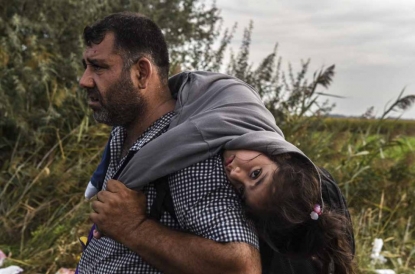 Refugees cross the Hungarian-Serbian border on September 14, 2015 (AFP Photo / Armend Nimani)
Refugees cross the Hungarian-Serbian border on September 14, 2015 (AFP Photo / Armend Nimani)There is a fine line between witnessing life as 'the journalist', and engaging with what you see on a human level. For me, that line was crossed many times while I was in Hungary.
I'd flown to Budapest five days earlier and headed straight to the Keleti train station where people from Syria, Afghanistan and Iraq were waiting to board trains to Vienna. The scene was relatively peaceful. Weary mothers were waiting for trains, smiling weakly as their children giggled and tickled each other on the floor.
At first, I was hesitant while filming, aware of their exhaustion and vulnerability, and knowing how I would feel if I was in their shoes and a camera was trailing me. But I was there to bear witness, and they withstood the cameras and photographs with a dignified grace I became familiar with over the coming week.
It was early September and tensions were building on the border with Serbia, so AFP photographer Attila Kisbenedek and I made the two and half hour drive to Röszke. I was grateful to be alongside Attila, who knew the lay of the land and as a Hungarian, could communicate with local people and the police.
Professional and personal boundaries were constantly tested during this mission. For example, during our assignment Attila helped pull a young boy from a crush of people, which some may say crosses the professional boundaries of journalism.
Attila and I arrived at midnight at the Röszke collection point. There was an eerie quiet, hundreds of people lying in sleeping bags out under the stars.
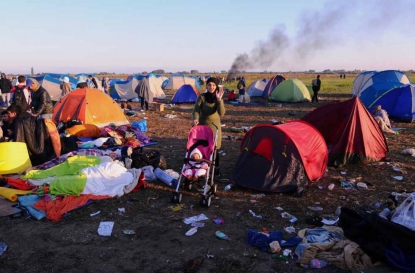 The "migrant collection point" near Röszke on September 8, 2015 (AFP photo / Attila Kisbenedek)
The "migrant collection point" near Röszke on September 8, 2015 (AFP photo / Attila Kisbenedek)Occasionally, you could hear the muffled cry of a baby, a hacking cough, or the quiet talk of volunteers handing out food to bleary eyed men and women. One young man – a sculptor from Syria – made space for me on a patch of damp cardboard outside his tent, as he furiously sketched in charcoal.
With manic stokes he brought to life a hallowed, gaunt face with dark circles under the eyes and a pained expression. I asked him who the man was and he simply turned and looked at me. Then I saw it. The resemblance to the artist took my breath away. The moment was broken when the tent behind us was unzipped from the inside and his wife gruffly passed him a small whimpering child. “My son needs the toilet”, he said apologetically and disappeared into the darkness. I felt embarrassed and privileged to witness such an intimate moment.
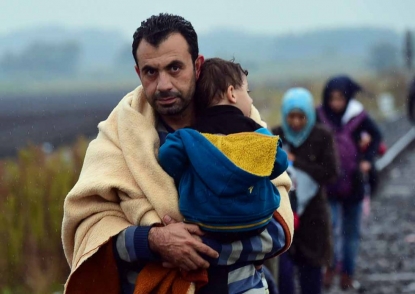 A migrant family arrives in Hungary near Röszke on September 10, 2015 (AFP photo / Attila Kisbenedek)
A migrant family arrives in Hungary near Röszke on September 10, 2015 (AFP photo / Attila Kisbenedek)After a few hours of sleep we were back at the camp at dawn. Skeins of smoke from small camp fires wafted into the damp atmosphere, along with the quiet talk of people rousing themselves for another day of waiting, of uncertainty and hope. It was only early September but temperatures dropped to 5 degrees overnight, so it was too cold for most to sleep. But the striking sunrise made this bleak situation exceptionally beautiful.
I tentatively approached a group of Syrian men huddled around a fire. They took one look at the AFPTV camera and excitedly ushered me into their inner circle. They passed me one of the ham rolls they had been given by local volunteers and started teaching me a few Arabic greetings, laughing ecstatically when I repeated the words in my British accent. One man, with a cheeky twinkle in his piercing green eyes told me in broken English of his journey from Syria and his ambition to reach Germany. There was hope and humour in his story.
We snatched a few more hours of sleep in the afternoon at the hotel but I was woken by a call from Attila saying we had to leave immediately. A group of men and women were running along a nearby train line after breaking out of the collection point and through police barricades.
My adrenaline surged as I filmed police resisting the group’s attempt to push forward, but after a short standoff the officers let them pass, and ended up escorting them along the track.
A Syrian in his late fifties walking along the track furiously shouted to me: “Are we not humans too?!”
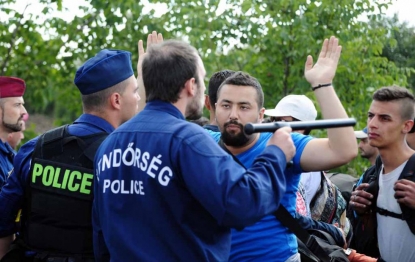 Police officers stop a group of migrants who broke out of the "collection point" near Röszke village on September 9, 2015 (AFP photo / Csaba Segesvari)
Police officers stop a group of migrants who broke out of the "collection point" near Röszke village on September 9, 2015 (AFP photo / Csaba Segesvari)Exhausted and exasperated the engineer explained his fury at being treated like a criminal. He had attempted the deadly sea crossing to Greece three times before finally making it. On one occasion the men spent two hours swimming around the boat in freezing water to prevent it from sinking, as women and children sat inside. His anger turned to quiet dejection when he told me of his wife and four daughters still in Aleppo.
He started to cry and asked me to stop filming. It was a hot day and he offered me water while apologising for his smell -- he hadn't been able to wash for days. It was in that moment I realised a person can be stripped of their humanity in many different ways.
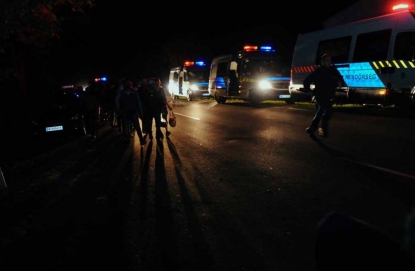 Migrants walk on a road near Rözske on September 8, 2015 (AFP / Attila Kisbenedek)
Migrants walk on a road near Rözske on September 8, 2015 (AFP / Attila Kisbenedek)That night we drove to a nearby petrol station where people smugglers were openly piling families into cars and driving them to Budapest. The mood was charged - furtive glances, quick hand gestures, wide-eyed men, women and children anxiously deciding if they should take the risk. I began filming but quickly realised this was no place for cameras.
Not far away, another stand-off between police and a group of migrants was unfolding. Under the cover of darkness fear and tension permeated the air, a policeman waved his light in my face and ordered me to turn the top light off on my camera. Suddenly a cloud streamed above the crowd – tear gas had been fired.
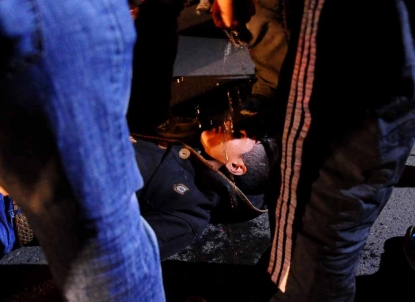 A young migrant lays on the road after police threw tear gas near Röszke on September 8, 2015 (AFP photo / Attila Kisbenedek)
A young migrant lays on the road after police threw tear gas near Röszke on September 8, 2015 (AFP photo / Attila Kisbenedek)A piercing wail filled the air and a group of men broke free of the crowd carrying two limp bodies. They doused the young men in water. Cameras swarmed as the two men remained motionless. “Where's the ambulance?” one man screamed at a policeman standing by nonchalantly.
Finally the two wounded men sputtered, wretched and gasped for breath. They remained unmoving on the floor, covered in water and gagging occasionally. A journalist behind me leaned in close and asked if I thought they were faking it. I couldn't even muster a response.
The coming days were raw, gritty and heavy with a sense of witnessing a painful moment in history. The few simple Arabic greetings the men from Syria had taught me became invaluable.
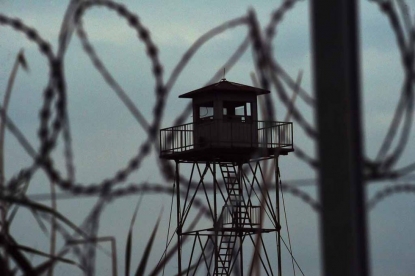 A Serbian border watchtower near Röszke, on Sept. 10, 2015 (AFP photo / Attila Kisbenedek)
A Serbian border watchtower near Röszke, on Sept. 10, 2015 (AFP photo / Attila Kisbenedek)As a blonde woman with a large video camera I was initially viewed with suspicion, but a quick 'Walaikum Salam', meaning peace be with you, and people's eyes would light up. They would smile and shout back 'Salam Walaikum'.
One beautiful young woman offered me figs while telling me that she had escaped Syria after her parents were killed. She said there was no safe place on earth for her to go now. Gently smiling she told me “I'm scared, I'm just...scared.”
After the release of the shocking video of migrants being “fed like animals” by police in a camp, we drove straight to a nearby centre for migrants. It was reminiscent of a World War II camp, with barbed wire fences, stony-face policemen smoking along the perimeters, and patrols with dogs.
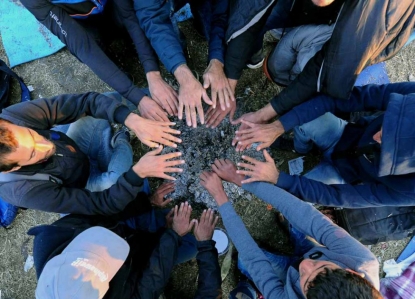 Refugees warm up at the "migrant collection point" near Röszke on September 8, 2015 (AFP photo / Attila Kisbenedek)
Refugees warm up at the "migrant collection point" near Röszke on September 8, 2015 (AFP photo / Attila Kisbenedek)Speaking to people through the wire we saw confusion, exhaustion, and frustration. But there was still the prevailing hope that they would soon be released and allowed to continue on their journey. I was glad for the company of my colleague Sonia Bakaric as we were escorted by a police officer around the perimeter.
I gestured to a guard with a German Shepherd, asking if I could film him. He shook his head and partly released the dog’s lead, sending the canine into a barking frenzy. I jumped and he and his two colleagues burst out laughing and continued to smoke.
It was a real wrench to leave the border. As we drove towards the Hungarian capital tanks were rolling in to reinforce police, and a sense of foreboding hung heavily in the air.
Budapest’s kebab restaurants, rowdy tourists and sex shops were a shock to the system. When I got back to Keleti station I realised that the scene had changed dramatically in just a few days. Hundreds of people were camped out, men were washing and shaving using a makeshift tap, charities handed out food and clothing and a throng of people waited patiently to board trains to Vienna.
A group of tourists wearing sunglasses and smart clothes meandered through the station smiling and taking pictures on their smart phones.
I spoke to one young Syrian man who showed me the mottled skin of his two-year-old niece, caused by drinking dirty water in a camp in Greece. An hour later I watched him board a train for Vienna -- his face a mix of relief and anxiety.
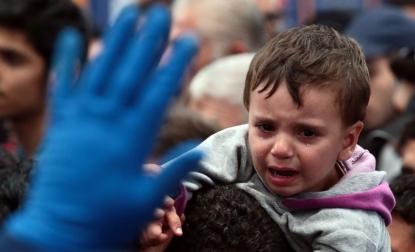 Police block refugees trying to board a train to Austria in Budapest's Keleti Station on Sept. 10, 2015 (AFP Photo / Ferenc Isza)
Police block refugees trying to board a train to Austria in Budapest's Keleti Station on Sept. 10, 2015 (AFP Photo / Ferenc Isza)But in the turmoil, hope and goodwill also reigned at Keleti station. Syrians laughed while forcing chocolate bars, bread, cheese and dried biscuits into my hands. Volunteers worked on little to no sleep. One man handed out free train tickets to Vienna. A Farsi speaker who had travelled from Austria offered his services as a translator for people from Iraq and Iran. I learned that desperation, darkness and division can also bring out the power and unity of the human spirit.
My week in Hungary felt more like a month and while relieved to be heading home, it was painful to leave behind these people and their important stories. I was told about one Syrian man who said “You only leave home if it's a shark's mouth.” I knew that the people I met would only endure fear, exhaustion and uncertainty if a shark's mouth was the alternative.
With a mixture of relief and regret I piled onto the plane back to London, Heathrow. As we soared over Europe, effortlessly crossing the borders others are risking their lives to breach, my heart and mind was with the people on the ground, risking everything to complete their long walk to freedom.
Helen Percival is an AFP video reporter based in London. Follow her on Twitter.
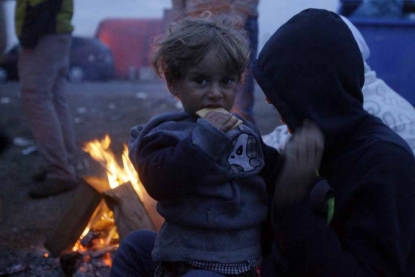 At the "migrant collection point" near Röszke on September 9, 2015 (AFP photo / Peter Kohalmi)
At the "migrant collection point" near Röszke on September 9, 2015 (AFP photo / Peter Kohalmi)

